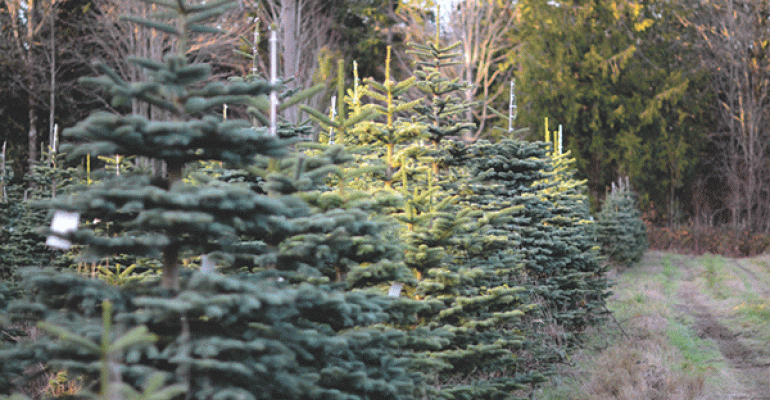All trees are good…right?
When it comes to Christmas trees, how true that is needs exploring. With choices ranging from pot-grown, rooted, cut or organic, in order to grow this seasonal pleasure we need to ensure other habitats and plants aren’t being destroyed. And then there’s this year’s new trend: rented. Renting might be the next eco trend in fashion, but it’s also the new buzzword in Christmas tree.

Rent-a-tree
Gloucestershire company Rental Christmas Trees estimates an average of eight million cut Christmas trees are consumed in the UK every year. In contrast, theirs are pot grown and can then be ordered online for local delivery. Several Christmas tree growers seem to be offering rentals this year – including in Leicestershire, London or Yorkshire.
Renters just need to water their tree daily, enjoy it over the festive season then Christmas, then return it. Always remember that extra lovely tree you had a few years back? With this service you can even give your tree a name and have the exact same one back the following year – just slightly taller.
Sourced well, your tree can be an incredibly positive purchase, offering new ways of creating income for family farms. 
Go organic
Almost as rare as a white Christmas, the UK’s only certified organic Christmas trees are grown by Simon Paddon, a third-generation farmer at Peach Hayne Farm.
“Being small we have looked at opportunities to diversify in order to maintain a viable farming business, and in 2013 decided to grow organic Christmas trees,” he explains.
Their organic herd of beef cattle need to graze on lush pasture, so trees were planted in the less productive fields. Seven years later in 2020, after a lot of learning, they sold their first few trees online, delivering direct to customers doors.
“Our journey has involved a lot of trial and error on how to manage weeds to give the trees a fighting chance as well as wildlife – it is amazing how many animals like to eat the tops off Christmas trees,” says Paddon.
“After our initial experiment with planting the trees directly into the fields, we have found that growing the plants in recyclable pots with organic compost for the first two years before planting out to be the best way to give the trees a good start.
“They are then planted out with degradable coir mats around the bases and spaced out so that we can mow between rows with a small second-hand tractor. The trees are hand trimmed to provide a good shape twice a year and hand weeded around the trunks when needed.”
Organic trees do cost more to grow, with no pesticides or artificial fertilisers and a lot more manual labour than larger non-organic enterprises. This may mean a pricier tree, but the plus side is more rural jobs and better biodiversity.
Tips for other green Christmas trees this year

– Check out local growers for lower ‘tree’ miles, buy organic or direct from a farmer if you can.
– Embrace wonky trees – many trees are not sold by commercial growers due to being ‘wonky’ so if you are at a seller or cut-your-own site, choose a more challenging shape, and get creative.
– Donate to a tree charity such as moortrees instead of – or as well as – buying your own.
– Going for an artificial tree? Recycling charity WRAP advising that artificial trees need to be used for up to nine Christmases to have a lesser impact on the environment than natural alternatives, depending on the method of disposal.
– Make your own ‘yule branch’ instead of having a tree – a foraged branch either left natural or painted white, decorated with tree ornaments.
– Don’t let your tree go to waste – if it isn’t a live tree that can grow in your garden till next year, many local authorities offer special collections of real Christmas trees in early January to ensure they are recycled correctly.
November 30 2021
November 27 2021
November 26 2021
November 23 2021
November 17 2021
November 03 2021
0
November 10 2021
1
November 26 2021
0
Featuring a cover interview with Patagonia, the latest news from COP26, and living for a new era. Plus meet the farm of the future, how to eat to protect biodiversity and seasonal eating in autumn.
New report outlines how diets can support an ecological farming system in the UK to cut carbon, restore nature and preserve farming livelihoods.
Set up by Guy Singh-Watson, Riverford now delivers across the country with a full range of fresh produce, meat, dairy and more.
Sign up to our newsletter
The twin crises of climate change and biodiversity losses will be the defining stories of our future, but it is not too late to change direction.
Here at Wicked Leeks, our mission is to help inform and inspire positive change. Our journalism is free to all because of this, but we want to reach as many people as possible who share our desire for a better world. We know our readers are some of the biggest advocates of sustainable living, and you can help us grow this movement by sharing this article widely, with your friends and on social media. Now is the time to act.
With a ban on new palm oil plantations in Indonesia about to expire, Anna Turns looks at certification and synthetic palm oil as sustainable solutions.
By Anna Turns – 29th November 2021
Combining trees with food production, and pioneering sustainable wheat, Wakelyns has become a hub for small businesses selling food direct from the farm. Olivia Oldham visits to find out more.
By Olivia Oldham – 22nd November 2021
Author of the National Food Strategy Henry Dimbleby has said he is “very worried” that new trade deals jeopardise the chance for a sustainable food transformation in the UK.
By Nina Pullman – 22nd October 2021
Wicked Leeks magazine is published by Riverford Organic Farmers.
Riverford grows and sells organic food through its award-winning veg boxes, delivering across the country to a loyal band of customers who share a passion for good food, good farming and good business.
© 2019 Riverford Organic Farmers Ltd
Sign up for the newsletter and receive the five latest stories, once a week. Wicked Leeks magazine is published by organic veg box company Riverford.




